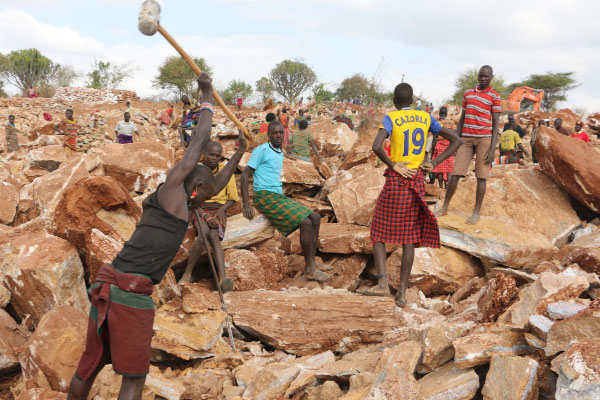Prime
Long-term fixes needed in sorting the economy

Youth in Karamoja crush stones to earn a living in Kosiroi Village, Tapac Sub-county in Moroto District. Many youth fail to work because they do not have work stations. PHOTO/ FILE
What you need to know:
The issue:
Sorting the economy.
Our view:
We need to firmly and decisively deal with that part of our public expenditure. That is where the haemorrhaging of resources that should have gone to developing the country is taking place and that is where it must be stopped.
The Ministry of Finance announced that up to 30 percent of the budgets of key government ministries, departments and agencies for the next financial year are to be cut in what the Secretary to the Treasury described as “budget repurposing (which is meant) to move money from certain areas that may be important, but not critical, to those that cannot be postponed”.
Parliament did not endorse the budget cuts in their entirety. Members of Parliament on the Committee on Presidential Affairs chose to either return to the budget items that the Ministry of Finance had either scrapped or allocated smaller amounts of money.
Whereas Finance had, for example, not provided for the logistical and financial support for the President’s international and regional travels, the committee deemed it necessary to provide Shs8b for that purpose. Again, whereas only Shs53b had been made available for the President to donate, the committee increased the donations’ kitty to Shs83b.
That was a setback for the technical officers and a public that has often been left bemused by the lack of frugality in the Executive and the Legislature, failure at prioritisation and refusal to subordinate individual to national interests.
The setback could, however, be a blessing in disguise because the budget cuts and suppression of parts of the budget for the 2023/2024 budget that Dr Chris Baryomunsi, the minister for Information, Communications Technology (ICT) and National Guidance, is talking about are not long-term fixes.
Local economic experts, civil society, the International Momentary Fund (IMF) and the World Bank have for several years now been raising red flags over our inclination to spend colossal sums of money on non-priority and nonproductive sectors and groups.
We, for example, have a Parliament of more than 500 members; a Cabinet of more than 80 ministers; more than 110 districts and district chairpersons and district speakers; more than 160 Resident District Commissioners (RDCs) and Deputy RDCs and; more than 1,140 sub-counties and town councils, each with a chairperson and a speaker.
All those go home with perks, including chauffeur-driven cars complete with bodyguards and escorts, hefty salaries and allowances, all of which are taking a heavy toll on the economy.
We need to firmly and decisively deal with that part of our public expenditure. That is where the haemorrhaging of resources that should have gone to developing the country is taking place and that is where it must be stopped. That is the kind of long-term fix that the economy requires.




